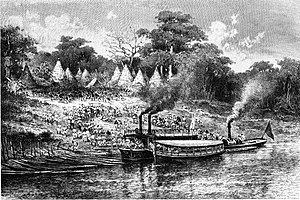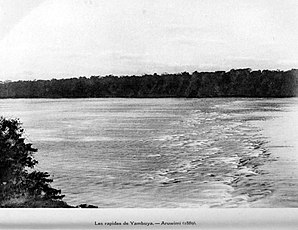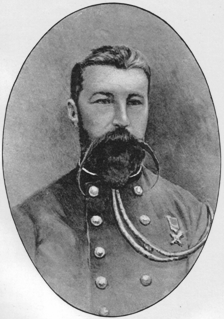| Yambuya | |
|---|---|
| Coordinates: 1°15′49″N24°33′10″E / 1.263669°N 24.552813°E Coordinates: 1°15′49″N24°33′10″E / 1.263669°N 24.552813°E | |
| Country | Democratic Republic of the Congo |
| District | Tshopo |
| Territory | Banalia |
Yambuya is a community in the Democratic Republic of the Congo, on the Aruwimi River, roughly due north of Yangambi. The river is navigable as far as Yambuya, but is blocked by cataracts further upstream.

The Democratic Republic of the Congo, also known as DR Congo, the DRC, DROC, Congo-Kinshasa, or simply the Congo, is a country located in Central Africa. It is sometimes anachronistically referred to by its former name of Zaire, which was its official name between 1971 and 1997. It is, by area, the largest country in Sub-Saharan Africa, the second-largest in all of Africa, and the 11th-largest in the world. With a population of over 78 million, the Democratic Republic of the Congo is the most populated officially Francophone country, the fourth-most-populated country in Africa, and the 16th-most-populated country in the world.

The Aruwimi River is a tributary of the Congo River, located to the north and east of the Congo.

Yangambi is a city in the Isangi Territory of Tshopo District, Orientale Province, Democratic Republic of the Congo.
Yambuya was made a base for the Emin Pasha Relief Expedition of 1886 to 1889, when an expedition led by Henry Morton Stanley went cross-country to the relief of Emin Pasha, General Charles Gordon's besieged governor of Equatoria, threatened by Mahdist forces. [1]

The Emin Pasha Relief Expedition of 1886 to 1889 was one of the last major European expeditions into the interior of Africa in the nineteenth century, ostensibly to the relief of Emin Pasha, General Charles Gordon's besieged governor of Equatoria, threatened by Mahdist forces. The expedition was led by Henry Morton Stanley and came to be both celebrated for its ambition in crossing "darkest Africa", and notorious for the deaths of so many of its members and the disease unwittingly left in its wake.

Sir Henry Morton Stanley was a Welsh journalist and explorer who was famous for his exploration of central Africa and his search for missionary and explorer David Livingstone. Upon finding Livingstone, Stanley reportedly asked, "Dr. Livingstone, I presume?" Stanley is also known for his search for the source of the Nile, his pioneering work that enabled the plundering of the Congo Basin region by King Leopold II of Belgium, and his command of the Emin Pasha Relief Expedition. He was knighted in 1899.

Major-General Charles George Gordon CB, also known as Chinese Gordon, Gordon Pasha, and Gordon of Khartoum, was a British Army officer and administrator. He saw action in the Crimean War as an officer in the British Army. However, he made his military reputation in China, where he was placed in command of the "Ever Victorious Army," a force of Chinese soldiers led by European officers. In the early 1860s, Gordon and his men were instrumental in putting down the Taiping Rebellion, regularly defeating much larger forces. For these accomplishments, he was given the nickname "Chinese Gordon" and honours from both the Emperor of China and the British.
- Relief expedition troops landing at Yambuya
- Rapids of Yambuya. - Aruwimi (1889)












